- Home
- Tanya Anne Crosby
The Summer Star: One Legend, Three Enchanting Novellas (Legends of Scotland Book 2) Page 8
The Summer Star: One Legend, Three Enchanting Novellas (Legends of Scotland Book 2) Read online
Page 8
At this point, he must accept his punishment with as much grace as he possessed, and he must come to terms with the truth of the matter: Rònaigh was ill-fated.
Nevertheless, for the first time in so many months he longed to be somewhere other than where he was. Feeling restless, he bounded from the bed, naked as the day he was begot and moved instinctively to the window, letting the sunlight warm his face.
Ach… how long had it been since he’d allowed himself such a simple pleasure?
He’d lived cold and lonely in the darkness since his brother’s death, but for the briefest time whilst they’d been conversing, that pawky girl had brought a ray of sunshine into Caden’s world. Now, rather than drink himself into oblivion, he found himself awaiting her return…
But what if she did not come back? What if she appealed to Alec’s better nature, and compelled him to take her away? What if she never returned?
He longed to know who she was, but even if he cared to brave the stairs, all his clothes were stored in the antechamber, left to rot in his trunks. For all the good that his eyes would do him, he might find himself wearing one of his mother’s gowns. Alec was right; he had too much pride to ask for help.
Again, his thoughts returned to the lass he’d discovered in his bed, wondering who she could be. Her name was Sorcha, or so she’d claimed. But Sorcha who? And whence did she come?
Caden would have asked these things and more, but for all the trouble he’d caused, that damned Alec now seemed to be making himself scarce. Friends they might be, but Alec knew better than to test him, and yet, test him he had. Left to his own devices, he’d gone and kidnapped some puir lass, and this was precisely what Rònaigh—and Caden—didn’t need now—to find himself at the end of her father’s blade, when he was unprepared to defend himself, or his people. So now, what consequences would they suffer for Alec’s impetuosity?
He was beginning to rethink the logic over leaving the man in charge.
He’d only hoped Alec would come to see reason and take the remaining village folk to plead their case with Auld MacLeod. They were not so long ago allies that the man should refuse them outright, particularly if they offered him Rònaigh. What good was pride, when they stood to lose their lives?
It was an untenable position for their people to be in—to exult in their past glories when they had no future. Let no man be fooled; the circumstances were dire.
And nevertheless, Sorcha made him smile…
For all that she’d believed herself a prisoner, she’d appeared to have no shame, and not a meek bone in her body. She spoke her mind, precisely as she pleased. What kind of ma and da raised such a brazen lass? In all his days, Caden had never met a woman so self-assured—except for Brighde. But that vagrant holy woman must be akin to the Gods, for she had come and gone from Rònaigh every year for as long as Caden had memory, and even so, she appeared years younger than Caden, with her bright green eyes, flawless skin and golden hair.
However, even Brighde’s beauty had not been proof enough for Caden. He was happy enough to see her, and pleased enough to see her go. To the contrary, this girl called Sorcha had infiltrated his thoughts so thoroughly and yet he didn’t have a clue what she looked like.
Her scent was like manna from heaven, and her voice was like a song that wouldn’t leave his skull.
Forsooth, had she been any other lass, she might have awakened screaming and never stopped. Instead, she’d presumed to interrogate him—the laird of this demesne, an heir of Conn—and she had spoken of his “wee commander” as though she’d seen a hundred thousand more. For that matter, she was either a whore or a healer. And Caden found himself hoping she would be the latter. With that in mind, and sick of waiting, he went to the door—a stride he’d made a thousand times before, only with seeing eyes—and yanked open the heavy door shouting at the top of his lungs. “Alec!” he roared. “Alec!”
Like the lion on his standard, his voice roared through the keep, and Caden felt a rush of relief when he heard heavy footsteps descend the stairs. Betimes, no matter that he’d prayed for it, he feared he would wake to find himself alone—that he might call out for Alec and no one would come.
Fortunately, ever faithful, his captain, his best friend, always appeared. “What is it?” Alec asked, panting. Caden imagined him red-faced and bent over, with his hands on his knees. “What can I do for ye, laird?”
It was on the tip of Caden’s tongue to ask about the girl, but instead he scratched his head, realizing he was as greasy as a butcher’s prick and his arse was like a bag o' washin. “I need a bath,” he said. And the instant the words were out of his mouth, he desperately longed for the feel of clean, hot water.
For a long, long moment, silence met his request. And then, Alec asked, a little out of sorts, “A bath, my laird?”
Caden could hear the emergence of a smile in Alec’s tone.
“Aye, y’ oaf. Ye heard me a’right. I’m in need of a bath. And if ye dinna wipe the silly grin from your ugly face, I shall remove it myself.”
Alec stifled a bit of laughter, but Caden heard it nonetheless. “Yeah, sir!” he said excitedly, and the joy in his tone betrayed him. Even before Caden could dismiss him, the man was already gone, racing down the stairwell, yelling for Bess. “He wants a bath,” he ran shouting. “Caden wants a bath!” And he laughed so stupidly that Caden could hardly be mad. In fact, he found himself grinning over the joy in Alec’s voice, and wondering when the devil that fool would confess himself to Bessie. No matter what passed—good or bad—Bessie was the person Alec ran to. In fact, Caden suspected he did so, even above his loyalties to Caden.
Surrounded by children, Sorcha found herself doing the most unexpected thing: She was picking herbs, like a woman possessed. As cold and forbidding as the island must be in winter, it was an apothecary’s delight. Already, she’d spotted yarrow, milk thistle and feverfew.
Butterflies flitted past. Bees buzzed along the blooms. Gannets and seagulls flew across a bright sky, filled with puffy white clouds and that strange bright star weaving in and out between them.
Down by the shore, the dark cliffs were covered with puffins, black-billed gulls and kittiwakes.
Sure enough, as they’d promised, the kids led Sorcha to a wealthy garden of ruagaire deamhan.
Though it was quite early yet for the star-shaped blossoms, they nevertheless blanketed the hillside. The raggedy petals and upright stems were so thick as to be woody and some were taller than the children.
To be sure, Sorcha plucked a leaf and held it up to the sunlight to see if it had perforations. And lo and behold, there they were.
More and more, Sorcha was convincing herself it must be Una who’d sent Alec to Lochinver to collect her. This is no ordinary field. Nor is this an ordinary isle. But, of course, if Una, herself, was the Cailleach… she would be older than time. She would be the blue-faced mother of winter. “Be the Maiden, Mother and Crone,” she used to say. “Be the Horned God, the Wild Spirit of the Forest!” It gave new meaning to her ancient toast.
So, now, considering the chances these people had found her without help—not likely—Sorcha crushed the ruagaire deamhan blossom between her fingers, releasing its purple juice.
The herb could be given as a tea or a tincture, and, to be certain, there was more than enough to do both.
Engaging the younglings to help her pick all the flowers, she showed them how to snip them precisely as Una had taught her, so to keep their hands free of dye, and nevertheless, by the time they were through, the kids all had bright red hands and Sorcha had a skirt full of blossoms, and deep purple stains all over her pale blue, borrowed gown. Even so, they laughed and ran about, with a flurry of waves, whilst Sorcha watched and laughed.
Later, once they had returned to the keep, Sorcha took a lesson from her sister Lìli and found and laid claim to a workbench. It was the first thing Lìli did upon arriving in Dubhtolargg, so, it stood to reason Sorcha could do the same. Why not? If they meant for h
er to help, she needed a good place to cut and grind the herbs. The least they could do after waylaying her was grant her a table.
And, then, because Una did not raise her, or any of her sisters to be timid, Sorcha also demanded the return of her grimoire and keek stane. Not only did that book contain the histories of her clan, but it was filled with priceless potions, all transcribed by Una. And that, Sorcha realized, was yet another clue, for Una had claimed she, herself, investigated each-and-every concoction, but there were hundreds in that book. It should have taken a dozen lifetimes to note so much. For sure, Una and Cailleach must be one and the same—sneaky auld wretch!
But that was a matter to be addressed with Una herself. And much to Sorcha’s delight, without any argument, Alec provided her back the keek stane and her grimoire, as well a workshop all to herself. He gave her the room they’d once used as a kitchen, before they’d moved it away from the tower. And this she learned from Bessie as Bessie showed her where to procure utensils—in a small room aside the newly separated kitchen.
So, now, the first thing that must be done: dry the flowers. Too much moisture could rot her tincture. Except, for those Sorcha meant to use as a tea, she placed them in baskets. All the rest, she spread about the stone floors, closest to the windows, so the sun might enter and warm them. Before she could do aught more with them, she needed the blossoms to rest about two days, and then after, she would gather them up again to create her medicinals.
All the while she worked, she hummed. Because, despite the situation she found herself in, she was deliriously pleased with her new arrangement, temporary though it might be. Her sister Lìli didn’t have a workroom so grand. Her sister’s table was stuffed in a corner of her bedchamber. And Una’s, for all the years she’d practiced her simples, had been tucked away in a dark, dank grotto beneath their mountain, with a mist so cold it pained the bones. However, for Sorcha, they’d placed her table in the center of a great room—as though they valued her contributions.
At home, she’d felt taken for granted. Because Sorcha was always the dependable one. She watched her nieces and nephews. She ran everyone’s errands. She fetched the water. She made sure everyone’s clothes were clean. While her sister Lìli cared for their sick, Sorcha only followed her about, helping when she could.
Truth to tell, Sorcha came away from the morning with a new sense of purpose—not simply a desire to reunite with Una. Mayhap, with a bit of luck, she could help these folks and then still find Una?
Forsooth, she felt sorry for Caden Mac Swein. How must the man feel to have felled his own brother? To spy him headless? To know it was because of his own actions? The thought alone made Sorcha long to pluck out her own eyes. But no sooner had she banished the troubling image, when she was reminded of her own trials.
In her mind’s eye, she saw again the image of Padruig looming over Aidan’s sire, blood splattered through his long beard and red stains on his sword. He’d swiped the sword on her mother’s skirt beforehand, and then Sorcha watched in horror as he’d defiled her lady mother.
Most cruelly, those were the last visions her keek stane revealed to her. What treachery! What wickedness! And Sorcha was blood to that man. Every time she considered this, her own blood ran cold through her veins.
In truth, Sorcha had never been the sort to lament her circumstances. She had been taught to make the most of every happenstance, because tomorrow was never certain. Case in point, merely a sennight past, Sorcha had believed herself a valuable member of her clan. Now, look how swiftly it turned out to be a lie!
Harried by her thoughts, Sorcha took a break from her labors and walked outside to reexamine the star. Like a beacon, it hovered over the isle… as though it meant to guide her to this very place. “I know it’s you,” she whispered. “I know it’s you, Una. Show me what to do…”
But the star didn’t reply. It hung stubbornly in the sky, shining down over the isle, silent and watchful, like a god’s eye.
“Halò, my lady,” said a little girl, waving at Sorcha with her bright-pink hands, and Sorcha waved back. Two little lads ran scurrying past, laughing as they passed.
It was only then Sorcha realized how many tots were running about… far more than grown men and women to care for them. It gave Sorcha a moment’s pause, realizing how vulnerable these people must be.
Then again, it made her think about her own clan, also much diminished in its own way, and she felt an instant kinship with these folks. So, then, until she had the chance to reunite with her mentor, these people had a need for her, and she intended to make use of her time here, beginning with that sad lump of a laird.
Sorcha forgave these people their presumptions and rudeness, empathizing with their plight. And, once again, taking charge, she marched straight out the door, over to the stable to release Liusaidh. And, by the by, while she was there, she set Diabhal free as well. Puir horse! Where in creation were these animals supposed to flee? Like Sorcha, they were trapped here, and neither had wings to fly—no matter what the children believed.
Faerie horse—pah! The next thing she knew, they would be claiming Liusaidh was a unicorn. By the end of the afternoon, both horses were lying about beneath an old rowan tree, and Sorcha was prepared, at long last, to climb the stairs and face Caden Mac Swein.
Chapter 9
Just when he feared the worst—that she was gone, Sorcha burst in as Caden was loitering in his bath, waiting for Moira to return—a good long time. So long, in fact, that while he sat unattended, he realized how accustomed he was to his household’s attentions. How much time had they wasted caring for him? How much of their care had he taken for granted? In his abject misery, Caden had thought to save his people from themselves, but who would save them from him? The last thing anyone needed was to placate his tempers or cater to his needs. He was a man grown, far more capable than most—far more capable than any who lay six feet below.
Far more capable than Davie.
He realized he had been behaving like a spoilt child, one who had the luxury to sulk, when, in fact, none of his people had any luxuries at all.
“So, it seems I am summoned to help ye,” she announced, haughty as you please.
Startled from his reverie, Caden yelped like a boy, splashing water into his face, and, for the first time in his life, he felt a moment’s chagrin. For land’s sake, he could have been doing anything in here. Anything! Didn’t she ken how to knock? He cursed his lack of sight that he could see naught beyond his thoughts—his ears as well, for they clearly had failed him. What, in God’s name, might she have done if she’d walked in to find him strangling his goose? He covered his chagrin with exasperation. “Unless ye ha’e the power to raise the dead,” he advised her. “Ye canna help me.”
Or rather, she could help him, but Caden was not a man given to lechery, and nevertheless, his libido had returned with a vengeance for, even now, he found himself sporting wood. Sinking further into the tub, vexed by the woman’s intrusion, he was nevertheless relieved she had returned. And yet, in truth, she behaved more as though she were his minny, and he’d lived twenty years without a mother. It was too late to adopt one now.
“Dinna pity yoursel’, Caden Mac Swein. Ye’ve two good legs, and two good hands, and ye ought to be more thankful!”
It was no more than Caden had already come to terms with himself, but put so precisely—by an audacious wench—an outlander at that—his sense of guilt intensified and his self-pity was reprehensible.
Then, again, had she lost a brother by her own hand? Could she bear to see herself as others saw her? A burden and a strain—undesirable and unforgivable?
Oblivious to his self-recrimination, the girl marched over to wiggle her fingers in Caden’s water, and then stood by his side, and Caden felt more than saw her. To be sure, he realized how much his senses had improved, because he could sense her shape beside him, long and lean.
But how could he know a thing like this?
“Your water is mucky,” she sai
d. “’Tis aboot time ye thought to bathe. Where are your clothes?” Each question was phrased with the same cadence and arrogance as any man in charge, and for a moment, Caden longed to defy her. Not even as a child had anyone spoken to him so truculently. Though, in truth, his toes were turning blue, and he loathed to imagine how much his todger had shrunk by now. “In the antechamber,” he grumbled. “In my coffer.” And he waved her away, grateful when she obeyed. Belatedly, he placed his hands over his nether regions, anticipating her return.
It wasn’t so much that he was embarrassed, but he wasn’t comfortable baring himself when he couldn’t even see her reaction. And why do I need to see her reaction?
Alec liked to joke that he had a baby’s arm hanging betwixt his legs, and Caden had never been the least bit shy about nudity. But, truth to tell, he wasn’t sure which of the two scenarios troubled him most: the possibility that Sorcha was young and lovely, or the likelihood that she was old and hackit. For some reason, either way, he was uncharacteristically bashful over the thought of baring his cock. He heard her rummage about in the anterior chamber and then she marched back in, ordering him out of the bath. “You’re a pawky wench!” he complained.
But the bloody woman remained undaunted. “And if ye believe it, ye wadna wish to meet my sisters.”
As ucht Dé! Caden loathed the thought. Could there possibly be another woman in her mold? Bossy and overbold? He was unaccustomed to women with such mettle.
Feeling not the least bit merciful, he removed his hand from his scrote, determined to make the lass blush like a skelped arse. By God, he was not so deficient in that area, and if his arms and legs were thick, his cock was no less blessed. Smirking, he stood, precisely as she asked him to. Water cascaded over his form, and nevertheless, she made no sound, no gasp, no reaction at all—a fact that brought a sting of warmth to Caden’s cheeks—and, nay, not the cheeks of his arse. The tiny hairs on his bottom prickled in distress.

 Lord of Shadows (Daughters of Avalon Book 5)
Lord of Shadows (Daughters of Avalon Book 5) To Love a Lord: A Victorian Romance Collection
To Love a Lord: A Victorian Romance Collection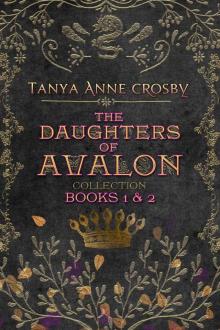 The Daughters of Avalon Collection: Books 1 & 2
The Daughters of Avalon Collection: Books 1 & 2 The Impostors: Complete Collection
The Impostors: Complete Collection The Holly & the Ivy (Daughters of Avalon Book 2)
The Holly & the Ivy (Daughters of Avalon Book 2)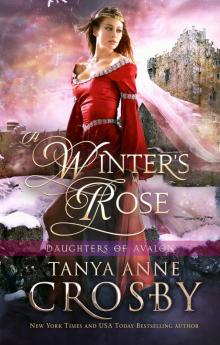 A Winter’s Rose
A Winter’s Rose Fire Song (Daughters of Avalon Book 4)
Fire Song (Daughters of Avalon Book 4) Elizabet
Elizabet Kissed; Christian
Kissed; Christian Once Upon a Knight
Once Upon a Knight Viking: Legends of the North: A Limited Edition Boxed Set
Viking: Legends of the North: A Limited Edition Boxed Set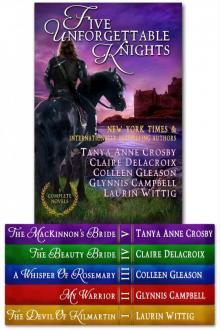 Five Unforgettable Knights (5 Medieval Romance Novels)
Five Unforgettable Knights (5 Medieval Romance Novels)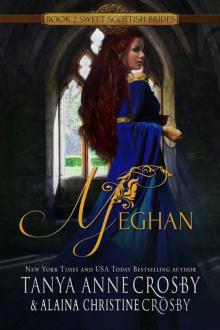 Meghan: A Sweet Scottish Medieval Romance
Meghan: A Sweet Scottish Medieval Romance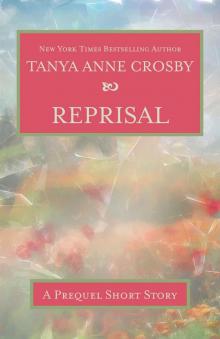 Reprisal: A Prequel Short Story to REDEMPTION SONG
Reprisal: A Prequel Short Story to REDEMPTION SONG Highland Song
Highland Song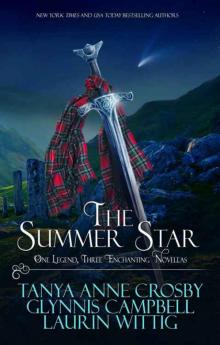 The Summer Star: One Legend, Three Enchanting Novellas (Legends of Scotland Book 2)
The Summer Star: One Legend, Three Enchanting Novellas (Legends of Scotland Book 2) Once Upon a Kiss
Once Upon a Kiss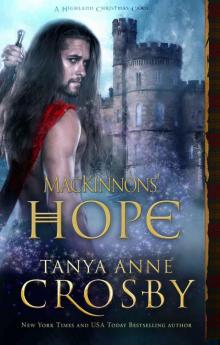 MacKinnons' Hope: A Highland Christmas Carol
MacKinnons' Hope: A Highland Christmas Carol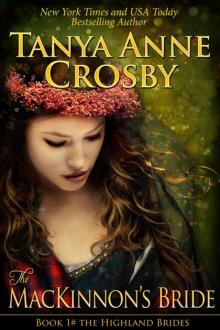 The MacKinnon's Bride
The MacKinnon's Bride Highland Brides 04 - Lion Heart
Highland Brides 04 - Lion Heart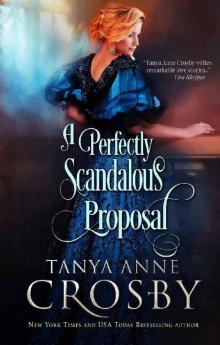 A Perfectly Scandalous Proposal (Redeemable Rogues Book 6)
A Perfectly Scandalous Proposal (Redeemable Rogues Book 6) Reprisal
Reprisal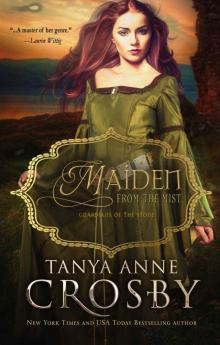 Maiden from the Mist (Guardians of the Stone Book 4)
Maiden from the Mist (Guardians of the Stone Book 4)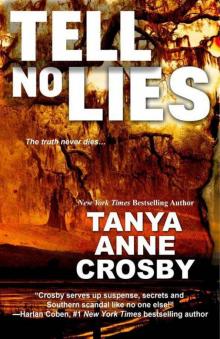 Tell No Lies
Tell No Lies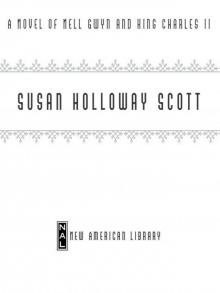 The King's Favorite
The King's Favorite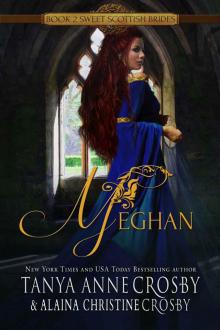 Meghan: A Sweet Scottish Medieval Romance (Sweet Scottish Brides Book 2)
Meghan: A Sweet Scottish Medieval Romance (Sweet Scottish Brides Book 2)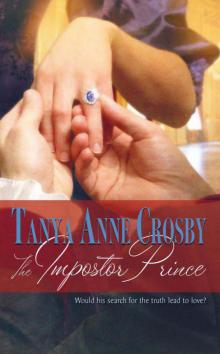 The Impostor Prince
The Impostor Prince Happily Ever After
Happily Ever After Sophie's Heart: Sweet Historical Romances
Sophie's Heart: Sweet Historical Romances Viking's Prize
Viking's Prize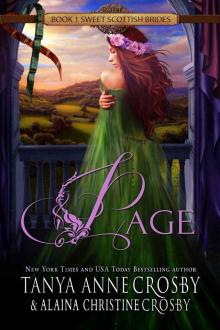 Page
Page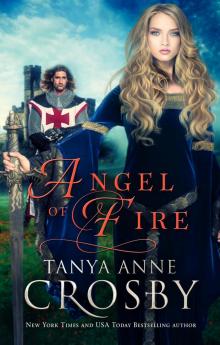 Angel of Fire
Angel of Fire Once Upon A Highland Legend
Once Upon A Highland Legend Highland Brides 03 - On Bended Knee
Highland Brides 03 - On Bended Knee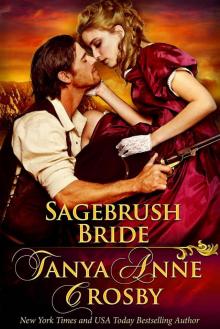 Sagebrush Bride
Sagebrush Bride Lyon's Gift
Lyon's Gift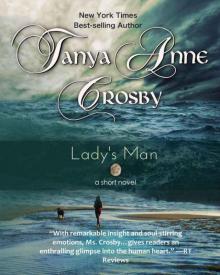 Lady's Man
Lady's Man The King's Favorite (Daughters of Avalon Book 1)
The King's Favorite (Daughters of Avalon Book 1)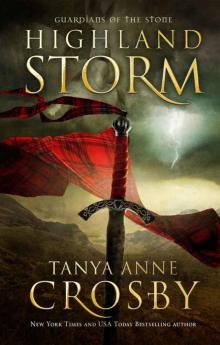 Highland Storm
Highland Storm Redemption Song
Redemption Song Three Redeemable Rogues
Three Redeemable Rogues